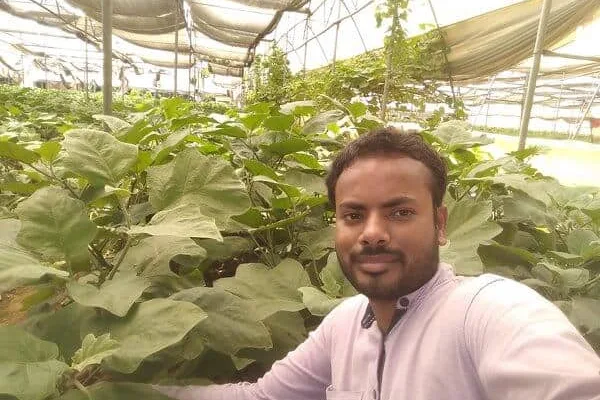Vishal Singh, a social worker, is a passionate believer of No Sir No Madam ethics. He works towards bringing integrated and sustainable development to the underprivileged farming sector. Besides this, he also runs a number of programs providing food, clothes, health services, and education to needful children.
He has received his M.Tech in Food Technology and Processing from the Indian Institute of Technology, Kharagpur (IIT-K). After earning his master’s, Vishal has worked as a researcher and a lecturer. He decided to quit his job as a part of giving back to the community. Vishal now campaigns to promote organic farming and actively recognizes himself as a farmer.
Vishal articulates — I first came across No Sir No Madam in IIT-K. Since, childhood, we are instructed to address seniors as ‘Sir/Madam’.
However, in IIT-K, no one would exercise salutation custom even while addressing the professors. This was a bit peculiar for me, as I was accustomed to formal titles until my graduation. I realized that people in IIT, did not co-relate respect with salutation. It was interesting to me, as I did not feel any boundary between me and my companions/ professors.
Furthermore, he opines that ‘Sir/Madam’ tradition sets the decorum for any communication in the future with a person. When individual addresses someone with a salutation, he/she implies that they want a formal-relation. This practice creates difficulty in open-flow of ideas while communicating with another person. Vishal believes that a person overlooks the objective in order to adhere to such formalities.
He quotes an experience from M.Tech, when he was given a project which involved developing a natural fruit slicer for his exploration theme. He had to purchase fruits from the market every day and research on them. Vishal eventually got bored with this mundane routine and expressed his lack of interest to his assigned professor. His teacher, more like his friend, explained the importance of the project to him. Vishal worked sincerely on his research topic after understanding its importance.
He confesses, “I would have done a mediocre research if I was not explained the significance of my assignment.” Vishal’s research is now published in three international research papers! It is also the most detailed data you can find on cutting and slicing from IIT-K. “I could accomplish this simply because I could approach my professor without any formal communication,” he adds.
He mentions that, he has not been able to find that salutation-ridden culture anywhere, since completing his post-graduation in IIT. Ever since working as a self-employed food developer, he has to deal with agriculture department officers. Vishal voices — officials in the government sector are stubborn. They have created a senior-junior environment in their offices. People have to cohere to such a decree.
I ponder that such commands hinder our growth as a nation. Individuals concentrate more on their behavior, instead of the reason for their meeting. Thus, it is vital to imbibe No Sir No Madam doctrine in public sector offices.
Salutation diktat impacts even the blue-collar workers in India. People judge each other depending on the type of work they do. Laborers are often looked down upon and treated differently.
“I recently remember, I was working on the fields, and some officials came up to me and questioned, ‘who is responsible here?’ I replied. I am the farmer who is in-charge. On learning that I am a farmer, they were a little rude in their correspondence. It was only when they realized that I am from IIT, that they showed me respect.” This happens all across in India, and it is of pressing matter, that we abolish such prejudice.
Vishal conveys that No Sir No Madam teaching can help in eradicating such discrimination. He recommends, first-name culture needs to be implemented in the education system. Children from a young age should be taught about the importance of first-name addressal.
Vishal gives a beautiful metaphor for the construction of a building, given to him by his guide in IIT. He stresses that while constructing a building, the base forms 90% of the building’s strength. Therefore, if we build the base flawlessly, we would not have to worry about the remaining floors as the base is strong. Similarly, we need to nurture the growth of kids in a way that they understand the relevance of first-name tradition.
He ceases by culminating to carry out mass campaigns about No Sir No Madam drive in government offices and universities. To preach people about the merits of this cordial precedent — “I have faith that we can progress as a nation, if we get rid of all the hierarchical taboos.”







Very very interesting and informative article